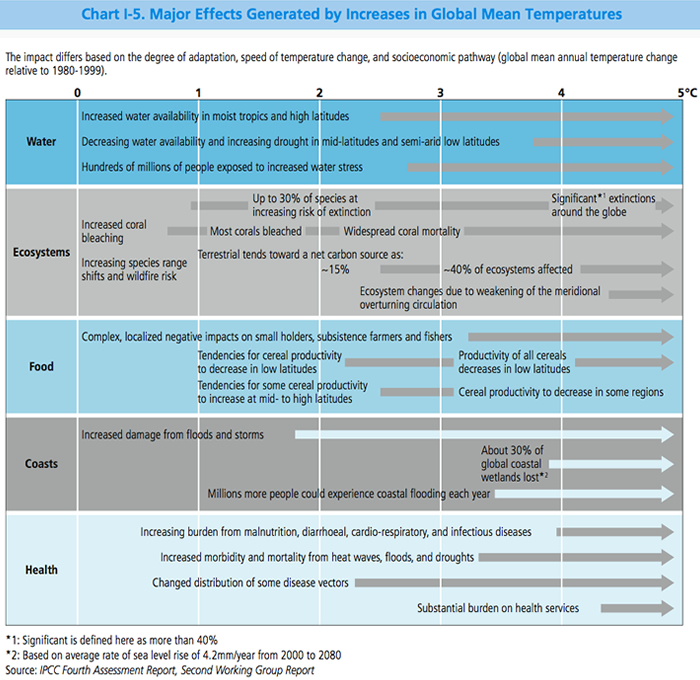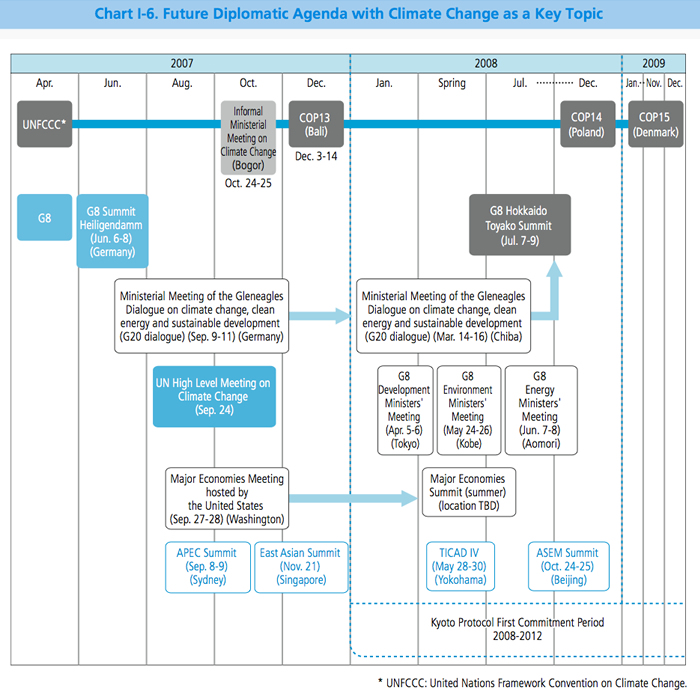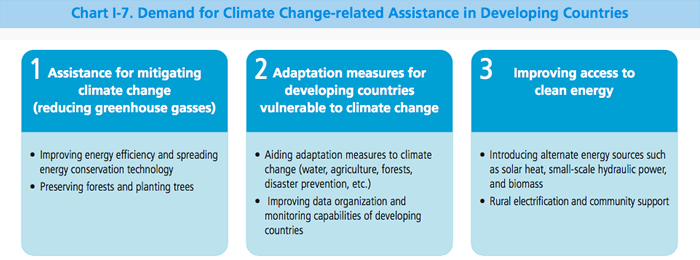Japan's Official Development Assistance White Paper 2007
Main Text > Part I JAPAN'S OFFICIAL DEVELOPMENT ASSISTANCE IN ITS TRANSITION PERIOD > Chapter 1 The Contemporary Role of International Cooperation > Section 3. The Climate Change Issue
Section 3. The Climate Change Issue
1. The Escalating Issue of Global Warming
In February 2007, the Intergovernmental Panel on Climate Change (IPCC)1 presented its Fourth Assessment Report (Summary for Policymakers of Working Group I Report), almost concluding that increases in greenhouse gasses due to human activities are the cause of global warming. The report also estimated average temperature increases based on a few different scenarios, while also clarifying that the natural and social environment of all regions within the world will be affected by global warming. The IPCC Third Assessment Report in 2001 went no further than pointing out that the impact of climate change is partially becoming evident on a regional basis. However, the IPCC Fourth Assessment Report sounded a strong warning on the escalation of global warming, stirring great interest in the international community.
The earth is already displaying the effects of climate change, including rising sea levels, deaths from heat waves, ecosystem-related changes such as the migration of animals and plants from their original regions to directions of high latitude and altitude, and the outbreak of infectious diseases transmitted by animals.2 It is expected that global warming will continue to grow in the future while its various effects become evident. The impact of climate change varies greatly based on the size of the phenomena occurring as a result of climate change and the vulnerability of the social system. Many developing countries are especially unprepared to address current climate conditions, and there is an increasing likelihood of their being influenced by the negative effects of climate change in the near future. Moreover, it is expected that, even within the same country, the socially vulnerable who live in areas unprepared for natural disasters and live on natural resources are the most susceptible to the impacts of environmental change that accompany global warming.
It is now recognized that the further impacts of climate change over the next 20 to 30 years will be inevitable, even if greenhouse gas emissions are sharply reduced. It is necessary to combine both mitigation measures (reducing greenhouse gas emissions) and adaptation measures (responding to the negative impact of climate change) in order to lessen the risks that climate change entails. The efforts by the international community to work together to reduce greenhouse gas emissions and prevent escalation of climate change while simultaneously strengthening capacity to respond to a worsening global environment have all become urgent issues to be addressed in order to establish a sustainable society.
Chart I-5. Major Effects Generated by Increases in Global Mean Temperatures

2. Climate Control Measures with Japanese Assistance for Developing Countries
In the Charter of Official Development Assistance (August 2003), Japan positioned environmental issues including global warming as ones that warrant a more robust response from international society. In Japan's Medium-Term Policy on ODA (February 2005), Japan established "actions against global warming" as one point of emphasis in the environmental field. Japan has proactively assisted developing countries in the environmental field, including addressing climate change, in order to balance both environment and development and to promote sustainable development.
Japan has promoted environmental and energy conservation measures, as well as developed and accumulated superior technology and knowledge to address difficulties experienced through pollution and oil shocks in the 1970s. Japan is currently utilizing them to in its assistance to developing countries, proactively advancing mitigation measures such as the deployment of energy conservation technology, enhancing energy efficiency, and addressing deforestation and forest degradation. For example, Japan is now assisting the construction of small hydraulic power plants and pumped storage power plants to substitute antiquated coal thermal power plants in China. At the East Asia Summit (EAS) in January 2007, Japan announced the Cooperation Initiative for Clean Energy and Sustainable Growth, with a particular focus on promoting energy efficiency and conservation, biomass energy, the clean use of coal, and eradication of energy poverty. Based on this initiative, steady efforts have been made including the hosting of training programs in the field of energy-related conservation as well as providing assistance to the improvement of energy infrastructure in countries concerned. Japan will provide energy-related aid of approximately US$2 billion over the next three years in the form of financial aid and technical cooperation. It is aimed at improvement of energy access including electricity infrastructure and rural electrification as well as energy efficiency and conservation. Assistance will take into account socio-economic situations in each EAS member country. In addition, investment loans of JBIC will be actively utilized. In regard to forestry preservation measures, in response to dramatically depleting forests in northern Laos due to slush and burn cultivation and illegal logging, Japan is providing supervision to local government staff so as to manage villages and forests along with the residents. Furthermore, technical assistance projects are underway to restore forest resources for the sustainable use through agroforestry,3 pig farming, fish aquafarming, and woven materials, while at the same time improving the livelihood of residents.
The promotion of the clean development mechanism (CDM) introduced under the Kyoto Protocol of the United Nations Framework Convention on Climate Change (UNFCCC) will reduce greenhouse gas emissions while also possibly allowing Japan to acquire emission credits, and thus assistance for developing countries is also being pushed in order to promote the CDM. For example, capacity-strengthening projects for forming CDM projects are now being implemented as technical knowledge is necessary to make the application for CDM projects.4 Specifically, as a result of strengthening the implementation structure for CDM in Argentina and implementing the Project for the Reinforcement of the Fundamentals for CDM Projects − a project that assists in promoting understanding of CDM in the country − from June 2006, domestic efforts towards the climate change issue are now advancing, including the preparation of design documents for specific projects5 that are necessary for the CDM application. Additionally, a development study has been underway since February 2006 in Chile for capacity development and promotion of CDM related to reforestation.
In June 2007, the Zafarana Wind Power Plant Project, a loan aid project to Egypt, was registered by the UN CDM Executive Board as the world's first large-scale CDM project directly assisted by bilateral ODA. The emission credits generated from this wind power station plan will be bought by a private enterprise of Japan. In September 2007, Japan, as an investing country, approved as a CDM project the introduction of subway cars with low greenhouse gas emissions to the Delhi Metro financed by a loan aid, and a part of a project financed by loan aid for environmental investment in Sri Lanka to turn coconut shells to charcoal and generate power. As host country approval has already been acquired by the Indian and Sri Lankan Governments, these will become new concrete examples of CDM projects that utilize official development assistance, if approval is received from the UN CDM Executive Board. Japan will continue to promote CDM utilizing official development assistance.6
There has been an increasing call for strengthening global efforts to adapt to climate change as the escalation of global warming becomes unequivocal. There are discussions on strengthening adaptation efforts in international organizations related to development, including the World Bank and the United Nations Development Programme (UNDP), and some developed countries are starting to strengthen their efforts.7
Until now, Japan has provided assistance that contributes to adaptation in fields such as disaster prevention, water, and agriculture. In the report entitled "International Cooperation for Adaptation to Climate Change in Developing Countries (Recommendations by Experts Committee)" submitted to the Ministry of Foreign Affairs in March 2007 by the Experts Committee on ODA for Adaptation to Climate Change, it was recommended that Japan should utilize its experience and knowledge gained through assistance in the area of adaptation to stand at the forefront of promoting international collaborations, and, that it should make efforts to increase interest in adaptation when implementing Japan's aid.
However, from the perspective of implementing aid in the least developed countries that are most vulnerable to the impact of climate change, it is necessary to give priority to addressing a large number of issues related to basic human needs, including poverty reduction, the promotion of education and the improvement of health and sanitation. There is great necessity for aid in infrastructure development required for daily lives, and there is a tendency for the aid requests from national governments to gravitate towards these issues. Developing countries must take the initiative to consider the impact of climate change themselves and establish development programs based on those considerations in order to carry forward adaptation measures; however, many developing countries lack the capacity to do so. Moreover, considerable administrative capacity for policy coordination is required in order to successfully address environmental issues such as climate change. It may be possible in developed countries for more than one ministry/agency to coordinate policies and make use of scientific knowledge to implement policies in a comprehensive manner, but in developing countries with weak administrative capacity, policy coordination is a difficult task in itself in many cases. Therefore, capacity building of governments of developing countries through means such as human resource development is important in order to push forward measures to address climate change in those countries.
Assistance for the adaptation to climate change needs to be carried out at various levels, from the individual or the community level up to the national level, and this will contribute to ensuring "human security" that Japan promotes. At the same time, because this is a new agenda within the field of development assistance, good practice will need to be accumulated in the future in the area of adaptation assistance.
Chart I-6. Future Diplomatic Agenda with Climate Change as a Key Topic

Chart I-7. Demand for Climate Change-related Assistance in Developing Countries

Box 1. Using ODA to Promote the Clean Development Mechanism (CDM)
3. Japan's "Cool Earth 50" Proposal
In May 2007, then Prime Minister Shinzo Abe announced "Cool Earth 50" in light of the present situation that necessitates prompt action toward climate change. In announcing the initiative, Japan proposed a long-term target of cutting greenhouse gas emissions by half from the current level by 2050 as a common goal for the entire world, while also suggesting three principles8 for constructing a framework beyond 2012, after the first commitment period of the Kyoto Protocol expires. In order to realize these principles, Japan announced it will provide wide-ranging support to developing countries with high aspirations to reduce greenhouse gas emissions and achieve economic growth in a compatible way. Moreover, Japan also expressed that such assistance would be given taking into consideration various circumstances of developing countries by utilizing Japan's technology and experience in mitigation and adaptation, and promoting the use of clean energy. To this end, the construction of a new financial mechanism was announced. Instead of diverting the funds for assistance to developing countries that has been traditionally extended, Japan is ready to look into the possibility of creating a new financial mechanism with a substantial size of funds for the relatively long-term, and call on other industrialized countries and international organizations to respond and take part in international cooperation.
H.E. Mr. Bharrat Jagdeo, President of the Republic of Guyana − a country located in South America facing the Caribbean Sea - visited Japan in June 2007. In talks with then Prime Minister Shinzo Abe during his visit, he noted the seriousness of flooding issues directly faced by Guyana, caused by rising sea levels and extraordinary weather spawned from climate change, while also highly evaluating the leadership of Japan on the climate change issue. Both countries presented the Joint Declaration on Enhanced Cooperation in Environment and Climate Change Issues between Japan and the Republic of Guyana, announcing their intent to strengthen cooperation in the field. Approximately 90% of Guyana's population resides in areas below sea level, prompting concern about great damage from rising sea levels and flooding caused by climate change. Just as with Caribbean states, Pacific Ocean island states, and African countries, developing countries vulnerable to climate change have a common concern. Developing countries have strong expectations in regard to proposals by Japan to utilize its experience and technology to strengthen assistance to developing countries within the field of climate change.
4. Japan's Leadership
The issue of climate change was a major theme at the G8 Summit held in Heiligendamm, Germany in June 2007. This is the result of climate change, which was somewhat considered to be one of the issues in the environmental field, coming to be seen as a major challenge directly faced by the international community today. The G8 countries agreed to consider seriously at least halving greenhouse gas emission amounts by 2050 throughout the world as a whole, and emphasized mitigation measures for climate change along with continuing assistance to developing countries for adaptation to climate change. Additionally, at COP13 of the UNFCCC to be held in Bali, Indonesia in December 2007, the issue of establishing a framework beyond 2012 will be discussed. Climate change is likely to become a major theme at the G8 Hokkaido Toyako Summit in 2008, and Japan, as the host country, is being looked to for leadership.
Currently, major emitters such as the United States have not joined the Kyoto Protocol. Furthermore, developing countries such as China and India do not have obligations to reduce greenhouse gas emissions within the Kyoto Protocol. However, China ranked second and India fifth in the world among greenhouse gas emitting countries as of 2002, and their emission amounts are predicted to increase into the future in line with their economic growth. Japan aims to construct an effective framework for all major emitters to participate beyond 2012, after the first commitment period of the Kyoto Protocol expires.
Japan's approach toward global warming as the common issue facing the international community will lead to exercising Japan's leadership on the world stage. Moreover, strengthening assistance for developing countries in this regard is one method to prompt developing countries that currently do not have obligations to cut greenhouse gas emissions, and thus take part in an international framework against global warming. While it is possible to assist climate change measures utilizing high-level environmental technology from Japan, the promotion of CDM that makes use of ODA can also be anticipated to assist in acquiring emission credits and contribute to meeting Japan's Kyoto Protocol commitments. Accordingly, Japan will address the issue of global warming by pushing forward the establishment of an effective framework beyond 2012, while also promoting assistance for mitigation and adaptation of developing countries.

Foreign Minister Masahiko Koumura speaking at the 62nd session of the United Nations General Assembly in September 2007


 Next Page
Next Page